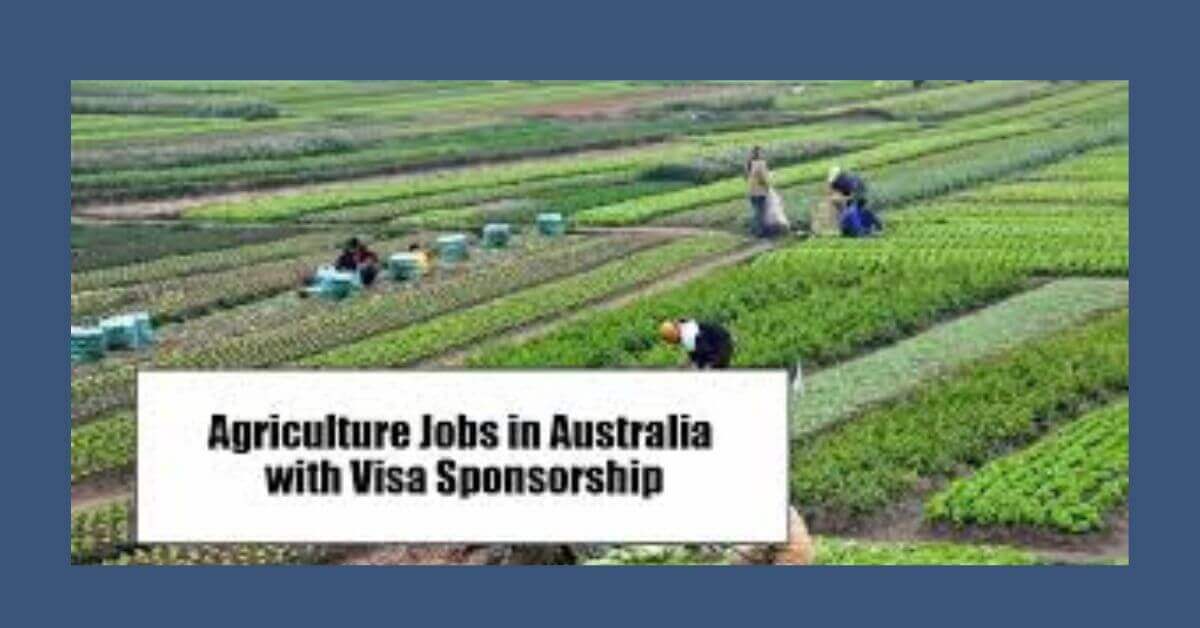Agriculture Jobs in Australia With Visa Sponsorship

Australia’s farms are more than fields and livestock; they are lifelines for thousands of foreign workers building a stable future abroad. In 2026, agriculture jobs in Australia are paying AUD 32+ per hour, with annual salaries reaching AUD 141,500 for experienced workers.
With ongoing labor shortages across regional Australia, farms are actively sponsoring overseas workers for both seasonal and long-term roles. These jobs don’t just offer income they offer legal work visas, affordable rural living, strong worker protections, and pathways to permanent residency.
Do Foreign Workers Need to Travel to Australia for Farming Jobs?
Yes.
All hands-on agricultural roles, such as crop harvesting, dairy farming, livestock handling, poultry farming, or operating farm machinery, require physical presence in Australia. These jobs cannot be done remotely.
However, high-level specialists (agribusiness consultants, agronomists, veterinarians, and agricultural engineers) may assist with planning or advisory work remotely at first, but on-farm duties still require travel to Australia under a valid work visa.
Australia’s Farming & Agricultural Work Visa Options
To address workforce shortages, Australia allows employers to sponsor foreign workers under multiple visa programs, depending on skill level, job type, and contract duration.
Main Visa Options for Agriculture Jobs
- Temporary Skill Shortage (TSS) Visa – Subclass 482
- Working Holiday Visa – Subclass 417 / 462
- Pacific Australia Labour Mobility (PALM) Scheme
- Skilled Employer Sponsored Regional Visa – Subclass 494
- Seasonal Worker Programme
- Permanent Skilled Migration Pathways (selected roles)
Important: Most farming jobs are located in regional Australia, which significantly improves eligibility for visa sponsorship and permanent residency pathways.
Why Agriculture Jobs in Australia Are in High Demand
High Demand
Seasonal peaks and long-term labor shortages create consistent demand for both skilled and unskilled workers.
Competitive Salaries
Wages increase during harvest and peak seasons, especially for machinery operators and supervisors.
Visa Sponsorship
Many employers sponsor foreign workers under TSS, PALM, and regional visa programs.
Permanent Residency Pathways
Several agricultural occupations qualify for regional PR programs after meeting work and residency requirements.
Wide Range of Roles
Jobs range from entry-level farmhands to technical and supervisory roles.
Work-Life Balance
Rural farming roles often offer predictable schedules and a slower-paced lifestyle.
On-the-Job Training
Most entry-level roles include paid training, even for beginners.
Lower Cost of Living
Accommodation and daily expenses are much lower in rural areas than in major cities.
Strong Worker Protection
Australia enforces strict workplace safety, pay, and labor laws.
Seasonal & Short-Term Options
Ideal for students, backpackers, and temporary workers.
Technology-Driven Farming
Modern farms use GPS tractors, smart irrigation, drones, and automation.
List of Agriculture Jobs in Australia with Visa Sponsorship
Crop Farming
Growing and harvesting wheat, barley, rice, corn, and vegetables.
Fruit Farming
Picking, packing, grading, and orchard maintenance for apples, grapes, bananas, citrus, and berries.
Horticulture
Vegetables, flowers, nurseries, landscaping, and greenhouse production.
Livestock Farming
Cattle, sheep, goats, pigs, dairy animals, and horses raised for food and trade.
Poultry Farming
Egg and meat production involving chickens, ducks, turkeys, and geese.
Beekeeping (Apiculture)
Honey production and crop pollination through managed bee colonies.
Aquaponics
Integrated fish farming and hydroponic crop systems.
Energy Farming
Solar farms and renewable agricultural energy projects.
General Responsibilities in Agriculture Jobs
- Planting, nurturing, and harvesting crops
- Monitoring soil health, moisture, and fertilizer use
- Operating tractors, harvesters, and irrigation systems
- Maintaining farm buildings and equipment
- Feeding and monitoring animal health
- Managing waste and sustainability systems
- Supervising farm workers and daily operations
- Maintaining inventory and production records
- Ensuring safety and biosecurity compliance
- Coordinating with suppliers and buyers
Salary Expectations in Australian Agriculture
- Average Annual Salary: AUD 98,592
- Average Hourly Rate: AUD 32.31
- Entry-Level Roles: From AUD 81,338 per year
- Experienced Specialists: Up to AUD 141,500 per year
Salaries depend on region, experience, machinery skills, and seasonal demand.
Do You Need Qualifications for Agriculture Jobs in Australia?
- Entry-Level Farm Jobs: No formal education required
- Machinery Operators: Experience preferred
- Skilled Roles (Agronomists, Vets): Degree or certification required
- Supervisory Roles: Prior leadership experience beneficial
Can Foreigners Apply for Agriculture Jobs in Australia?
Yes.
Australia actively recruits foreign workers through employer sponsorship and government-approved labor programs.
Common applicant regions include:
- Asia
- Africa
- Pacific Islands
- Europe
Conclusion:
In summary, crops are composed of a diverse array of components, such as cereals, grains, and vegetables. Wheat has a substantial impact on the production of cereals, which requires a diverse range of deliveries. The surrender of wheat in Australia has fluctuated by an estimated two metric kilograms per hectare.
Frequently Asked Questions:
What types of agriculture jobs are available in Australia?
Jobs include farm workers, fruit pickers, livestock handlers, dairy farm workers, and machinery operators. Seasonal and permanent positions are available.
Do I need qualifications for agriculture jobs in Australia?
Most entry-level farm jobs require no formal qualifications, but experience in farming, machinery operation, or animal care can be beneficial. Some skilled roles may need certifications.
Can foreigners apply for agriculture jobs in Australia?
Yes, Australia offers visa options like the Working Holiday Visa (Subclass 417/462) and the Temporary Skill Shortage Visa (Subclass 482) for foreign workers in agriculture.



